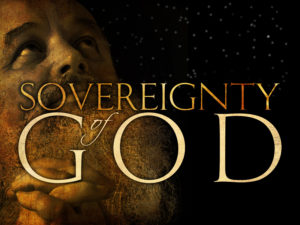 1 Chronicles 29:11 (NKJV) 11 Yours, O LORD, is the greatness, The power and the glory, The victory and the majesty; For all that is in heaven and in earth is Yours; Yours is the kingdom, O LORD, And You are exalted as head over all.
1 Chronicles 29:11 (NKJV) 11 Yours, O LORD, is the greatness, The power and the glory, The victory and the majesty; For all that is in heaven and in earth is Yours; Yours is the kingdom, O LORD, And You are exalted as head over all.
Isaiah 46:9-10 (ESV) 9 remember the former things of old; for I am God, and there is no other; I am God, and there is none like me, 10 declaring the end from the beginning and from ancient times things not yet done, saying, ‘My counsel shall stand, and I will accomplish all my purpose,’
Daniel 4:34 (NKJV) 34 And at the end of the time I, Nebuchadnezzar, lifted my eyes to heaven, and my understanding returned to me; and I blessed the Most High and praised and honored Him who lives forever: For His dominion is an everlasting dominion, And His kingdom is from generation to generation.
Psalm 93:1-5 (NKJV) 1 The LORD reigns, He is clothed with majesty; The LORD is clothed, He has girded Himself with strength. Surely the world is established, so that it cannot be moved. 2 Your throne is established from of old; You are from everlasting. 3 The floods have lifted up, O LORD, The floods have lifted up their voice; The floods lift up their waves. 4 The LORD on high is mightier Than the noise of many waters, Than the mighty waves of the sea. 5 Your testimonies are very sure; Holiness adorns Your house, O LORD, forever.
Psalm 115:3 (NKJV) 3 But our God is in heaven; He does whatever He pleases.
Psalm 135:6 (NKJV) 6 Whatever the LORD pleases He does, In heaven and in earth, In the seas and in all deep places.
Job 23:13 (ESV) 13 But he is unchangeable, and who can turn him back? What he desires, that he does.
Foundational to our faith is the recognition of God’s absolute sovereignty in creation, providence and grace. There is no possible way for the Scriptures to call Him “Lord” unless this is the case (Gen. 2:4-5, 7-9; 1 Chron. 29:11; Rom. 10:9). As Christians we pray recognizing the Sovereignty of God. J.I Packer makes this point:
“This is the fundamental philosophy of Christian prayer. The prayer of a Christian is not an attempt to force God’s hand, but a humble acknowledgement of helplessness and dependence. When we are on our knees, we know that it is not we who control the world; it is not in our power, therefore, to supply our needs by our own independent efforts; every good thing that we desire for ourselves and for others must be sought from God and will come, if it comes at all, as a gift from His hands… This is luminously clear to us when we are actually praying, whatever we may be betrayed into saying in argument afterwards. In effect, therefore, what we do every time we pray is to confess our own impotence and God’s sovereignty The very fact that a Christian prays is thus proof positive that he believes in the Lordship of his God.”[1]
This can also be said about our salvation. For the true believer salvation is seen as a complete work of God (Eph 2:8-10; Rom. 4:5; 11:6; Tit. 3:5). Again J.I. Packer comments:
“Nor, again, am I going to spend time proving to you the particular truth that God is sovereign in salvation. For that, too you believe already. Two facts show this. In the fir st place, you give God thanks for your conversion. Now why do you do that? Because you know in your heart that God was entirely responsible for it. You did not save yourself; He saved you. Your thanksgiving is itself an acknowledgement that your conversion was not your own work, but His work.[2]
Packer goes on to say;
“ You would never dream of dividing the credit for your salvation between God and yourself. You have never for one moment supposed that the decisive contribution to your salvation was yours and not God’s. You have never told God that, while you are grateful for the means and opportunities of grace that He gave you, you realize that you have to that, not Him, but yourself for the fact that you responded to His call. Your heart revolts at the very thought of talking to God in such terms. In fact you thank Him no less sincerely for the gift of faith and repentance than for the gift of a Christ to trust and turn to.”[3]
But there is an obstacle that is ever present that shudders and rebels at the thought of the Sovereignty of God. It is the flesh (Ezek. 18:25; Rom. 8:5,7-8; Gal. 5:17, 19-21; 1 Jn. 2:16)! The subject assaults our desire for autonomy and we cling to our imagined “free will” and see ourselves as the ultimate pilots of our destinies. Arthur Pinks puts it this way:
“To some of our readers it may appear that in pressing the Sovereignty of God to the lengths we have man is reduced to a mere puppet. Hence, to guard against this, they would modify their definitions and statements relating to God’s Sovereignty, and thus seek to blunt the keen edge of what is so offensive to the carnal mind.”[4]
Calvin noted as well the hatred of men for the sovereignty of God.
“No man, therefore, will duly and usefully ponder on the providence of God save he who recollects that he has to do with his own Maker, and the Maker of the world, and in the exercise of the humility which becomes him, manifests both fear and reverence. Hence it is, that in the present day so many dogs tear this doctrine with envenomed teeth, or, at least, assail it with their bark, refusing to give more license to God than their own reason dictates to themselves.” [5]
There can be no denying it, the Sovereignty of God is alien and an obnoxious doctrine to the minds of the unregenerate and for the Christian it is a battle that must be won over the flesh which desires its own way. I know of no other concept about the nature of God that raises such opposition from within and outside. But for the Christian a growing knowledge and understanding of this great doctrine will bring comfort, delight, wonder, and ultimately a deep and meaningful worship of the very God of the Scriptures who is sovereign over the affairs of men and the universe.
It must also be admitted that we would have no sure knowledge of His sovereignty unless it had been revealed in the Scriptures and that that knowledge is limited to what is revealed.
Deuteronomy 29:29 (NKJV) 29 The secret things belong to the LORD our God, but those things which are revealed belong to us and to our children forever, that we may do all the words of this law.
Deuteronomy 30:12-14 (NKJV) 12 It is not in heaven, that you should say, ‘Who will ascend into heaven for us and bring it to us, that we may hear it and do it?’ 13 Nor is it beyond the sea, that you should say, ‘Who will go over the sea for us and bring it to us, that we may hear it and do it?’ 14 But the word is very near you, in your mouth and in your heart, that you may do it.
It is our disregard and/or our lack of contentment for that which has been revealed and our desire to know those things that have been hidden in the secret counsels of God that causes us to question the very character of God. We jump to false conclusions and assault the justice, goodness, and holiness of God as mere creatures of His creation as if we have some right to so (Rom.9:14, 19-12).
For the Christian who lives in submission to the Lordship of Christ it is quite a different story. There is no doubt of the goodness of our Lord’s motives and actions. God’s Sovereignty becomes a fortress in times of distress, pain and conflict an reminder that nothing comes into the life of the believer that God has not ordained for our good and to conform us to the character of Christ (Rom. 8:28-29). We find our future hope and security firmly in the grips of a sovereign God whose purposes in salvation cannot be thwarted (John 6:39; 10:28; Rom.8:31-39). John Piper called it a “precious truth.”
“One reason this doctrine is so precious to believers is that we know that God’s great  desire is to show mercy and kindness to those who trust him (Ephesians 2:7; Psalm 37:3-7; Proverbs 29:25). God’s sovereignty means that this design for us cannot be frustrated. Nothing, absolutely nothing befalls those who “love God and are called according to his purpose” but what is for our deepest and highest good (Psalm 84:11). Therefore, the mercy and the sovereignty of God are the twin pillars of my life. They are the hope of my future, the energy of my service, the center of my theology, the bond of my marriage, the best medicine in all my sickness, the remedy of all my discouragements. And when I come to die (whether soon or late) these two truths will stand by my bed and with infinitely strong and infinitely tender hands lift me up to God.”[6]
desire is to show mercy and kindness to those who trust him (Ephesians 2:7; Psalm 37:3-7; Proverbs 29:25). God’s sovereignty means that this design for us cannot be frustrated. Nothing, absolutely nothing befalls those who “love God and are called according to his purpose” but what is for our deepest and highest good (Psalm 84:11). Therefore, the mercy and the sovereignty of God are the twin pillars of my life. They are the hope of my future, the energy of my service, the center of my theology, the bond of my marriage, the best medicine in all my sickness, the remedy of all my discouragements. And when I come to die (whether soon or late) these two truths will stand by my bed and with infinitely strong and infinitely tender hands lift me up to God.”[6]
[1] “Evangelism and the Sovereignty of God,” J.I. Packer, Inter Varsity Press, 1961, pp.11-12
[2] Ibib. p. 12
[3] Ibib. p.13
[4] Arthur Walkington Pink, The Sovereignty Of God, WORDsearch CROSS e-book, 193
[5] John Calvin, Institutes of the Christian Religion, trans. Henry Beveridge (Edinburgh: Calvin Translation Society, 1845), WORDsearch CROSS e-book, Under: “Chapter 17. Use to Be Made of the Doctrine of Providence.”.
[6] John Piper, Desiring God Resources, “A Very Precious and Practical Doctrine” September 29, 1981
Stephen Evans, “sovereignty,” in Pocket Dictionary of Apologetics & Philosophy of Religion, (Downer’s Grove, IL: InterVarsity Press, 2002), WORDsearch CROSS e-book, Under: “sovereignty.”
